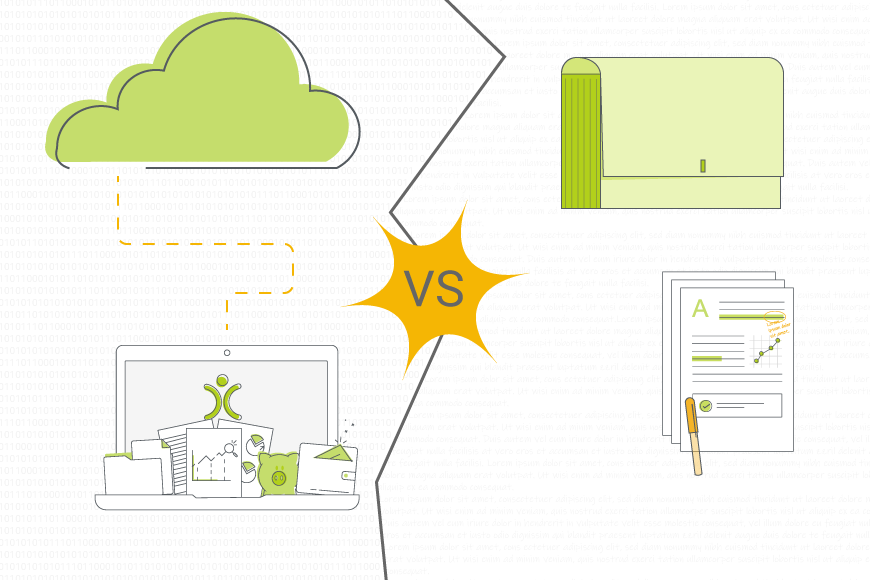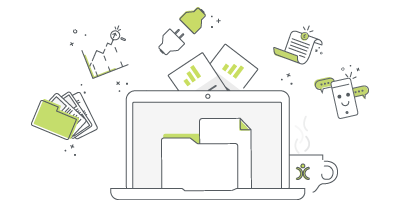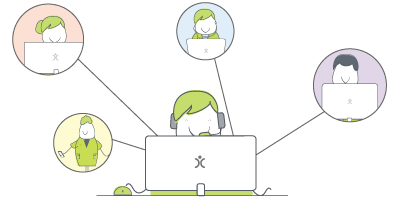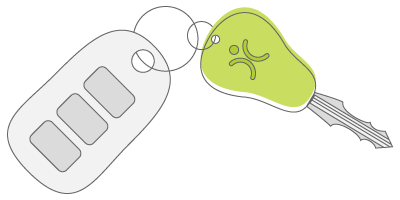Online CRM vs an Offline Solution
17 Apr 2023
In this age of cloud computing, you might be surprised how many people come to us asking if Open CRM can be installed on-premises. These are people looking for an offline or intranet only CRM solution. We have to tell them that no, we don’t, we are exclusively an online, cloud-based CRM system.
Usually these conversations move on to exploring why they’d prefer an offline CRM system. Essentially trying to convince us to make an exception. Many of their reasons, however, can actually be solved by implementing a variety of security and other user access controls. Saying that, others are not so easily remedied.
I’d like to spend a bit of time, therefore, in this blog to explore:
- Why people are interested in an offline CRM solution
- What an online CRM system (like Open CRM) can do to address these requirements
- And some addition benefits to being online vs offline
But first, I want to talk a little bit about the history of CRM systems and how they came to be (almost exclusively) online, in the cloud.
CRM Roots
The origins of CRM essentially stem back to the very first time a service provider tried to connect with their clients. This will have been via hand-written receipts, contracts, details stored in notepads, ledgers and that kind of thing. The very first CRM systems will have been big old filing cabinets creaking under the weight of folders and binders – the customer database.
As time went on, businesses recognised the value of this customer database. So they implemented smarter methods of managing their client details. Enter the rolodex. And remember the 1980’s, where any aspiring entrepreneur wouldn’t be seen dead without their filofax?
Whilst this helped get your customer details in one handy place, it meant the data was still stored in silos. Unless everyone is sat in the same office, you don’t all have access to that data.

The salesforce alternative?
There are a lot of a CRM providers out there and it can be difficult to know how one compares to another. Click to find out more about how we stack up against the competition.
find out moreThe Digital Age
With the advent of affordable computers, that data got transferred from paper onto spreadsheets. This made it far easier to work with. As you could chop and change the information to present it in your preferred format. This was a big leap forward as it meant you could email the data or copy it onto a disc. Even those not in the office could get access to your client database. It was the start of a global digital transformation.
This did still mean that you worked from one master database. Managing data became someone’s responsibility. And there was always the risk that people using copies of that main spreadsheet were using information that was out of date.
However, that all changed with the advent of cloud software and the availability of online CRM.
Offline Requirements vs Online Solutions
So with all that in mind, why are some people so keen on using an offline solution? Well, the main arguments I hear for it tend to fall into one of three categories:
- “It feels more secure if it’s in my office instead of in a data centre somewhere.”
- “I don’t want my users accessing our data from unsecured places (i.e. free wifi in a café)”
- “I want to have total and complete control over the system”
I’d like to go through each of these to explore where each of them comes from. And how the solution isn’t necessarily taking your CRM offline. Or at least, that’s not the only solution.
Security: Being in control of the infrastructure
There is an understandable comfort in being able to see and touch the server that your company data is held on. It makes you feel as though, because it is under your control and you know where it is at all times, that it is somehow more secure than it would be in a data centre.
Whenever I speak to someone who feels this way, I have to sympathise. It does feel safer.
But I also have to ask: When was the last time you updated the server software? How often are you searching for and installing security patches? How many people have access to that server? Is your backup server in another building in case of fire or other emergencies? How automated is your changeover process? And so on. And so on…
The reality is that online, cloud-based systems, including CRM systems, are far safer than one hosted on the server in the back room of your office.
We discuss the details in this blog about our infrastructure, but in short, we have a dedicated team who manages the software and security of our servers. Our primary and backup facilities are located on separate sites, both of which are covered by AWS’ extensive security protocols.
I could go on and on. But the bottom line is this: Keeping your company data on your own servers may feel like it gives you more security. Compared with a truly robust cloud infrastructure, that’s an illusion.

Watch and learn
If you're looking for further information on how specific features and functionality play out in OpenCRM, why not click to check out our webinars?
watch nowRestricting Access: Only here—not there
Another common misconception with online CRM systems, when compared with on-premises systems, is that they are easy to access from unsecure locations.
When a system is only available via your office intranet, of course you have total control over the connections used to access it. There’s only one and it’s yours, so of course it’s secure.
And this was certainly an issue in the early days of the cloud. Access from anywhere was the main selling point after all.
But these days, any online CRM system worth using will give administrators the ability to both whitelist and blacklist IP addresses. This means that you can ensure your users can only access your data from within the office and other authorised locations.
You could, for example, use a VPN (virtual private network) to allow your users to access your online CRM system from anywhere, knowing that they are doing so securely. If you then whitelist the VPN’s IP address and block all others, you know that your users will always be accessing your company data securely. No matter where they are.
This turns a supposed benefit of an offline or on-premises system into a benefit for a cloud-based or online CRM.
Total Ownership & Control: From configuration to updates
The final “benefit” that people will argue their offline CRM system gives them, in comparison to an online system, is the control they have over it.
In many cases, on-premises systems are bought outright. So the company owns them completely and has total control over what happens after installation. This means they can decide how they are configured and whether or not they want to update them (usually at a cost).
And they’re right, they do have total control.
But a good online CRM system, where you pay a monthly subscription like Open CRM, will let you carry out all the necessary configuration to ensure it fits your business. Any upgrades should also be included in that subscription fee.
Now sometimes, that upgrade is going to give you features you don’t need or want (which you then turn off). But more often, those updates will bring security benefits or features that you actually do want. They may even make your business more efficient.

Want to take it for a test ride?
Nothing compares to trying out a piece of kit for yourself. Click to sign up for a free trial and see if OpenCRM has the look and feel (as well as the features and functionality) that you're looking for.
try it outOnline CRM Systems: Additional Benefits
I hope I’ve shown in the above examples that the arguments for an offline CRM system are far outweighed by the benefits of keeping it online.
And if not, let me add a couple more benefits of cloud-based systems to see if I can convince you further.
Remote assistance: No expensive call-out fees
Let’s say you need a fix implemented or some configuration carried out on your CRM system, something that simply has to be done by your provider.
In the offline world, that fix or configuration will need to be carried out within your office. Meaning that you’re going to need to pay for someone to drive out to your office, spend the time doing the work, and then drive back. It can leave you with a hefty call-out fee. And will probably result in at least one of your team members losing at least part of their day babysitting them while they do it.
But if you’ve got an online CRM system, that fix or configuration can take place over a remote, screenshare session. No travel fees (and no having to provide lunch). In fact, in some cases, that screenshare won’t even need to take place. The technical gurus may be able to fix it in the backend without having to take up any of your team’s time.
Initial Investment: Plus future features
Cloud-based, online CRM systems are typically charged on a monthly subscription. Maybe you pay some extra up front for training. And/or configuration to be carried out by your provider, but that’s it. You pay for what you’re using.
With on-premises, offline systems you’re often paying for the rights to the software as a whole. So that you can make those config changes I mentioned earlier. Or, if you’re going for a totally bespoke system, you’ve got to cover the costs of the entire build process.
That means that the initial investment for an offline CRM system will far outstrip that for an online one. And the offline system may require additional payments for upgrades or new features. Whereas the online system will have that be included in the subscription price.
Now, over several years, the costs may start to balance out. But that initial investment will always be less when you go with cloud CRM.

The bottom line
We've got a simple pricing structure: a per user monthly fee that gives you access to the whole of Open CRM. No restrictions and no hidden fees. See? We told you it was simple.
find out moreTaking the above arguments into consideration, what conclusions can we draw? If you have the appropriate measures in place to keep your data safe, you can rest assured the cloud is a safe. It’s a speedy and easily accessible solution to your online CRM system requirements.
If you like to talk to a member of the Open CRM team about the security of our system and what it can do for your business, just click the icon on the right to start chatting or give us a call on 01748 473000.
Before I got my start in the tech industry as part of Apple’s UK Mac launch team, I was a professional drummer (notice I didn’t say musician). But once I got in, I was hooked and I’ve been involved in the tech industry, primarily software development, for over 35 years. I founded this company and I now have the enviable title of System Architect (as well as Managing Director) here at OpenCRM.